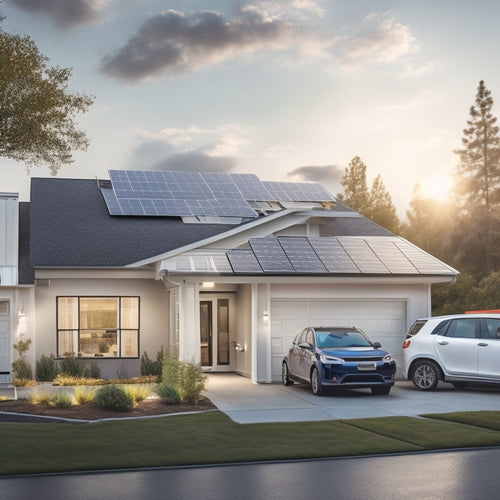
Expenses to Consider When Installing Rooftop Solar Panels
Share
When installing rooftop solar panels, you'll need to take into account various expenses beyond the initial upfront costs, which can range from $15,000 to $30,000 or more. You'll need to factor in potential roof repair or replacement costs, inverter replacements every 10 to 15 years, permit and inspection fees, and ongoing maintenance costs, including cleaning, electrical inspections, and monitoring system subscriptions. These expenses can add thousands of dollars to the total cost of ownership. As you weigh the benefits of solar energy, it's crucial to get a clear understanding of these expenses to make an informed decision about your investment.
Key Takeaways
- Total installation costs range from $15,000 to $30,000 or more, depending on system size and equipment quality.
- Roof condition and repair costs must be factored in, as old or damaged roofs may require replacement before installation.
- Inverter replacement expenses, ranging from $1,000 to $3,000, should be considered in the total cost of ownership.
- Permit and inspection fees, typically ranging from $1,000 to $3,000 or more, are additional expenses to consider.
- Ongoing maintenance costs, including cleaning, inverter replacement, and electrical inspections, should be budgeted for to ensure optimal system performance.
Upfront Installation Costs
The upfront installation costs of rooftop solar panels are the most significant expenses you'll incur when changing to renewable energy. These costs include the purchase and installation of the solar panels, inverters, mounting hardware, and other necessary equipment. The total cost can range from $15,000 to $30,000 or more, depending on the size of your system and the quality of the equipment.
However, you don't have to pay the full amount upfront. You can investigate financing options, such as loans or power purchase agreements, to spread the cost over time.
Additionally, you may be eligible for tax incentives, such as the Solar Investment Tax Credit (ITC), which can help offset the cost. The ITC allows you to claim a credit of 26% of the total installation cost on your federal income taxes.
Roof Repair and Replacement
When considering rooftop solar panels, you'll need to factor in the condition of your roof, as it will be supporting the added weight of the panels. A thorough roof inspection is vital to identify any potential issues that may arise during the installation process.
You'll need to assess the shingle durability and weather resistance to guarantee your roof can withstand the elements and support the solar panels.
If your roof is old or damaged, you may need to replace it before installing solar panels. This can be a significant expense, but it's important to make sure the safety and efficiency of your solar panel system.
The cost of roof repair or replacement will vary depending on the size of your roof, materials used, and labor costs.
It's important to work with a reputable solar panel installer who can assess your roof's condition and provide guidance on any necessary repairs or replacements.
They can help you determine the best course of action to guarantee a safe and efficient solar panel installation.
Inverter Replacement Expenses
Frequently, rooftop solar panel systems require inverter replacements every 10 to 15 years, as these components are prone to degradation over time. You should take into account the cost of inverter replacement when calculating the total expenses of your solar panel system.
The inverter lifespan varies depending on the type and quality of the inverter. String inverters, which are commonly used, typically last around 10-12 years, while microinverters can last up to 25 years. The cost of replacement inverters ranges from $1,000 to $3,000, depending on the inverter type and capacity.
It's crucial to evaluate the inverter replacement expenses to guarantee you have a thorough understanding of the total cost of ownership. You may also want to investigate warranties and maintenance agreements that cover inverter replacements to minimize your out-of-pocket expenses.
Permit and Inspection Fees
Your rooftop solar panel system installation requires a series of permits and inspections, which come with associated fees. These fees vary depending on your location, system size, and type of permits required. Typically, you'll need electrical, building, and zoning permits.
Electrical permits guarantee your system meets local electrical codes, while building permits verify your system is structurally sound. Zoning permits confirm your system complies with local zoning ordinances.
Inspection requirements also differ by location, but you can expect multiple inspections throughout the installation process. These inspections verify your system meets permit requirements and is installed correctly.
You may need to pay for each inspection, which can range from $50 to $500 or more, depending on the jurisdiction and complexity of the inspection.
Understanding the permit types and inspection requirements for your area is essential to budgeting for these expenses. On average, permit and inspection fees can range from $1,000 to $3,000 or more, depending on the scope of your project.
Be sure to factor these costs into your overall budget to avoid unexpected expenses.
Ongoing Maintenance Costs
Once your rooftop solar panel system is installed, you'll need to evaluate ongoing maintenance costs to confirm peak performance and longevity. Regular maintenance is vital to guarantee your system operates at its maximum capacity. You'll need to take into account the costs of cleaning services, which can range from $100 to $300 per year, depending on the frequency and method of cleaning. Additionally, investing in monitoring systems can help you identify potential issues early on, saving you money in the long run.
Here is a breakdown of typical ongoing maintenance costs:
| Maintenance Task | Frequency | Cost |
|---|---|---|
| Cleaning | Quarterly | $100-$300/year |
| Inverter Replacement | Every 10-15 years | $1,000-$3,000 |
| Electrical Inspection | Every 5 years | $100-$300 |
| Panel Inspection | Every 2 years | $100-$200 |
| Monitoring System Subscription | Monthly | $10-$50/month |
Frequently Asked Questions
Can I Install Rooftop Solar Panels on a Metal or Tile Roof?
You can install rooftop solar panels on a metal or tile roof, but you'll need to take into account the unique requirements for each. Metal roofs require specific mounting systems, while tile roofs offer benefits like increased durability and ease of installation.
Do Solar Panels Increase My Property's Value?
You're wondering if solar panels enhance your property's value, right? Think of them like a luxurious backyard oasis - they're a sought-after amenity that increases appeal. According to a study, solar panels can increase property appraisal values by up to 4.1%, making your home more desirable.
Are Rooftop Solar Panels Compatible With Smart Home Systems?
You'll be happy to know that rooftop solar panels seamlessly integrate with smart home systems, allowing you to optimize energy usage through advanced solar integration and smart technology, giving you a futuristic, energy-efficient living space that's customized to your needs.
Can I Install Rooftop Solar Panels Myself to Save Money?
Taking the DIY route with solar panels might seem like a cost-effective idea, but trust us, you'll likely encounter installation challenges that'll leave you scratching your head - and potentially voiding your warranty.
Will Rooftop Solar Panels Void My Roof's Warranty?
You'll want to check your roof's warranty before installing solar panels, as improper installation can void it. Make sure you follow the manufacturer's installation guidelines to avoid warranty implications, and consider hiring a certified installer to confirm compliance.
Conclusion
As you commence on installing rooftop solar panels, remember that the initial investment is just the tip of the iceberg. Like a puzzle, various expenses will eventually fall into place, including roof repairs, inverter replacements, permits, and ongoing maintenance. By factoring these costs into your budget, you'll avoid a financial sunburn and guarantee your solar panel system shines brightly for years to come.
Related Posts
-

What Electric Vehicle Owners Need for Home Energy
As an electric vehicle owner, you need to optimize your home energy system to guarantee efficient, sustainable, and c...
-

Why Higher Upfront Costs Are Worth It
You pay a premium for high-quality, energy-efficient products, but they're worth it. With durability testing ensuring...
-

7 Ways to Save on Residential Home Solar Panels
You can save thousands on your residential home solar panels by leveraging financial incentives, dealer offers, and s...


